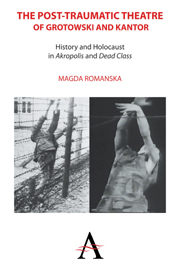 The Post-traumatic Theatre of Grotowski and Kantor
The Post-traumatic Theatre of Grotowski and Kantor Book contents
- Frontmatter
- Contents
- Foreword by Kathleen Cioffi
- Preface
- Acknowledgments
- List of Illustrations
- Introduction
- Part I Our Auschwitz: Grotowski's Akropolis
- Part II Our Memory: Kantor's Dead Class
- Chapter 22 Tadeusz Kantor: A Very Short Introduction
- Chapter 23 Dead Class: The Making of the Legend
- Chapter 24 Dead Class in Poland
- Chapter 25 The Polish History Lesson
- Chapter 26 Dead Class Abroad
- Chapter 27 On Not Knowing Polish, Again
- Chapter 28 The Visual and the Puerile
- Chapter 29 The National and the Transnational
- Chapter 30 Witkiewicz's Tumor
- Chapter 31 An Age of Genius: Bruno Schulz and the Return to Childhood
- Chapter 32 Conversing with Gombrowicz: The Dead, the Funny, the Sacred and the Profane
- Chapter 33 Panirony: “A pain with a smile and a shrug”
- Chapter 34 Raising the Dead
- Chapter 35 Dead Class as Kaddish…
- Chapter 36 Dead Class as Dybbuk, or the Absence
- Chapter 37 The Dead and the Marionettes
- Chapter 38 Men and Objects
- Chapter 39 Dead Class as Forefathers' Eve
- Chapter 40 Dead Class: The Afterlife
- Postscript
- Appendix
- Notes
- Bibliography
- Index
Chapter 32 - Conversing with Gombrowicz: The Dead, the Funny, the Sacred and the Profane
from Part II - Our Memory: Kantor's Dead Class
- Frontmatter
- Contents
- Foreword by Kathleen Cioffi
- Preface
- Acknowledgments
- List of Illustrations
- Introduction
- Part I Our Auschwitz: Grotowski's Akropolis
- Part II Our Memory: Kantor's Dead Class
- Chapter 22 Tadeusz Kantor: A Very Short Introduction
- Chapter 23 Dead Class: The Making of the Legend
- Chapter 24 Dead Class in Poland
- Chapter 25 The Polish History Lesson
- Chapter 26 Dead Class Abroad
- Chapter 27 On Not Knowing Polish, Again
- Chapter 28 The Visual and the Puerile
- Chapter 29 The National and the Transnational
- Chapter 30 Witkiewicz's Tumor
- Chapter 31 An Age of Genius: Bruno Schulz and the Return to Childhood
- Chapter 32 Conversing with Gombrowicz: The Dead, the Funny, the Sacred and the Profane
- Chapter 33 Panirony: “A pain with a smile and a shrug”
- Chapter 34 Raising the Dead
- Chapter 35 Dead Class as Kaddish…
- Chapter 36 Dead Class as Dybbuk, or the Absence
- Chapter 37 The Dead and the Marionettes
- Chapter 38 Men and Objects
- Chapter 39 Dead Class as Forefathers' Eve
- Chapter 40 Dead Class: The Afterlife
- Postscript
- Appendix
- Notes
- Bibliography
- Index
Summary
If Witkacy provides the structural and textural framework of Dead Class, and Schulz gives it its philosophical and existential framework, then it is Gombrowicz who provides the play's subtly ironic and iconoclastic undertone. In Dead Class, Kantor, as he himself explains it, reads Schulz through Gombrowicz, paying homage to Gombrowicz's cult novel, Ferdydurke. In his review of Kantor's show, Jan Bończa-Szabłowski points out that, besides Schulz, “The child-mannequins carried by the old people remind us of Gombrowicz's thesis about an eternal childhood lasting into old age, but also of the vision of the world as a classroom. The place where we still have some delusional hope that we will learn something, find some definitive meaning to our actions, feelings and dreams.”
Born in 1904, Gombrowicz studied law in Warsaw while simultaneously pursuing his literary ambitions. His first volume of short stories was published in 1933, and his first comedy, Iwona, Princess of Burgundy, was published two years later. In 1939, Gombrowicz traveled to Argentina for two weeks, but war broke out, and he ended up staying in Argentina for over 20 years, working at a bank to support himself. For a long time, Gombrowicz was considered a dissident writer by the Polish postwar communist government, and he published his work through Kultura, a magazine for Polish intellectual emigres in Paris. In 1950 Gombrowicz published his novel Trans- Atlantic. It was followed by another novel, Pornography, in 1960, and by Cosmos in 1965.
- Type
- Chapter
- Information
- The Post-traumatic Theatre of Grotowski and KantorHistory and Holocaust in 'Akropolis' and 'Dead Class', pp. 238 - 243Publisher: Anthem PressPrint publication year: 2012


